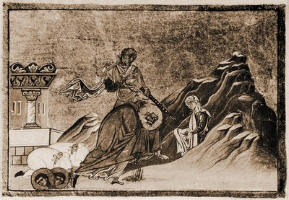
The Works Of Dionysius The Areopagite Volumes 1 & 2
SECTION I
Concerning common and distinctive theology, and what is the Divine Union and distinction.
LET then the self-existent Goodness be sung from the Oracle as defining and manifesting the whole supremely-Divine-Subsistence in its essential nature. For, what else is there to learn from the sacred theology, when it affirms that the Godhead Itself, leading the way, says, “Why dost thou ask me concerning the Good?—None is Good except God alone.” Now, this, we have thoroughly demonstrated elsewhere, that always, all the God-becoming Names of God, are celebrated by the Oracles, not partitively, but as applied to the whole and entire and complete and full Godhead, and that all of them are referred impartitively, absolutely, unreservedly, entirely, to all the Entirety of the entirely complete and every Deity. And verily as we have mentioned in the Theological Outlines, if any one should say that this is not spoken concerning the whole Deity, he blasphemes, and dares, without right, to cleave asunder the super-unified Unity.
We must affirm, then, that this is to be received respecting the whole Deity. For even the essentially Good Word Himself said, “I am Good.” And a certain one of the God-rapt Prophets celebrates the Spirit as “the Good.” And again this, “I am He, Who is.” If they shall say that this is said, not of the whole Deity, but should violently limit it to one part, how will they understand this? “These things, saith He, Who is, Who was, Who is to come, the Almighty,” and “Thou art the same,” and this, “Spirit of truth, which is, which proceedeth from the Father.” And if they say that the supremely Divine Life is not coextensive with the whole, how is the sacred Word true which said, “As the Father raiseth the dead and maketh alive, so also the Son maketh alive whom He will,” and that “the Spirit is He, Who maketh alive?” But, that the whole Deity holds the Lordship over the whole, one can scarcely say, as I think how many times, in reference to the Paternal Deity, or the Filial, the word “Lord” is repeated in the Word of God, as applied to Father and Son. But the Spirit also is Lord. And “the beautiful and the wise” are also sung respecting the whole Deity. And the light, and the deifying, and the cause, and whatever pertains to the whole Godhead, the Oracles introduce into all the supremely Divine hymnody—collectively, when they say “all things are from Almighty God;” but, specifically, as when they say, “all things were made through Him and to Him,” and “all things in Him consist,” and “Thou shalt send forth Thy Spirit, and they shall be made.” And, that one may speak summarily, the supremely Divine Word Himself said, “I and the Father are One,” and “all that the Father hath are Mine,” and, “All Mine are Thine, and Thine, Mine.” And again, whatever pertains to the Father and Himself, He attributes to the supremely Divine Spirit, collectively and in common—the works of God—the homage, the fontal and ceaseless cause and the distribution of the goodly gifts. And I think, none of those, who have been nourished in the Divine Oracles with unprejudiced conceptions, will oppose this, that all things befitting God belong to the whole Godhead, according to the divinely perfect Word. Since, then, we have demonstrated and defined these things from the Oracles,—here indeed partially, but elsewhere sufficiently—we will undertake to unfold every Divine Name whatsoever, which is to be received as referring to the whole Deity.

 Keep Site Running
Keep Site Running